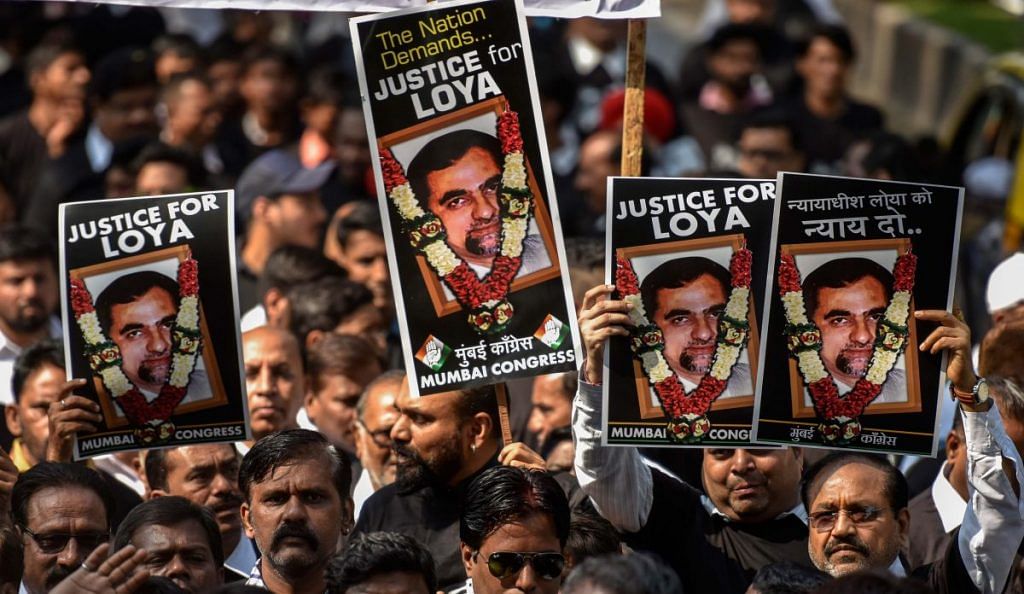Justices Swapna Joshi, S.B. Shukre and S.M. Modak recuse themselves after plea in high court alleges that Loya died of poisoning from a radioactive isotope.
New Delhi: In three days, three judges of the Nagpur bench of the Bombay High Court have recused themselves from hearing a matter pertaining to the safe custody of records in the controversial case of special CBI judge B.H. Loya’s death.
On Wednesday, Justice Swapna Joshi declined to hear the case, two days after Justices S.B. Shukre and S.M. Modak did the same. Justice Joshi didn’t offer any reason for her decision.
In the order passed by Justices Shukre and Modak Monday, the division bench too didn’t give any reason behind the decision. They said, “Not before us.”
The matter was to be heard by Justices P.N. Deshmukh and Joshi after Shukre and Modak’s recused themselves.
The judges’ move comes after advocate Satish Uke filed a plea in the high court last week alleging that Loya died of poisoning from a radioactive isotope. Uke submitted that copies of the post-mortem report and other documentary evidence pertaining to the death and investigation of Loya’s death have been fudged.
“His lordships expressed that their names were reflected in the issue surrounding Judge Loya’s death, hence it would not be proper that they should hear the plea,” Uke told ThePrint Monday.
In his plea, Uke submitted that Bharatiya Janata Party (BJP) president Amit Shah had met with then chairman of the Atomic Energy Commission Ratan Kumar Sinha during his March 2015 visit to Nagpur. Uke alleged that all official records of the meeting were wiped out.
According to Uke, the alleged meeting was proof that Loya died of radioactive poisoning.
Also read: Two judges present with Loya when he died are among 6 set to be elevated to Bombay HC
The 3 judges
The names of Justices Shukre, Modak and Joshi feature in the reported sequence of events leading up to Loya’s death in Nagpur on 1 December, 2014.
Loya had gone to Nagpur to attend the wedding reception of Justice Joshi’s daughter. Justice Shukre was one of the two judges who were with Loya at the Nagpur hospital when he died. Justice Modak had travelled with Loya to Nagpur to attend the reception.
In April this year, a three-judge bench led by then chief justice of India Dipak Misra refused an independent probe into Loya’s death, relying on the testimony of Justice Modak who had claimed that he was present when the CBI judge “suffered a stroke”. He was one of the four judges whose testimonies the court relied upon to refuse probe.
At the time of his death, Loya was presiding over the politically sensitive trial in the alleged fake encounter of Sohrabuddin Sheikh. Shah is one of the key accused in the case, along with 22 others.
Also read: How Supreme Court dissected & dismissed petitions for a fresh probe into judge Loya death
Uke’s petition
In his plea, Uke submitted that his former colleagues, retired district judge Prakash Thombre and advocate Shrikant Khandalkar, had told him that Loya died due to poisoning from a radioactive isotope.
Thombre and Khandalkar have died since in allegedly mysterious circumstances.
Uke said that though Loya died at Ravi Bhavan, Nagpur, his post-mortem was done at the Government Medical College, Nagpur, which falls under a different jurisdiction.
Prior to their death, Thombre and Khandalkar had informed Uke that records at Ravi Bhavan had been manipulated “to shield the real perpetrators of the crime”.
Uke also submitted that in the second week of October 2014, Loya had reached out to him through Thombre and Khandalkar saying that he was being pressurised in the Sohrabuddin case.
While Uke never met Loya, he spoke to him via video calling in October 2014. Recounting the events, Uke said he met a third unknown person in the presence of Thombre and Khandalkar who had called Loya through a “tab-mobile”.
In that video call, Loya allegedly told Uke that Maharashtra Chief Minister Devendra Fadnavis was pressurising him to give a favourable outcome in the matter. Loya also allegedly told Uke about a certain Shubhanshu Joshi from Nagpur who would pay him the bribe.
Loya had admitted to Uke that he had already been given a draft judgment giving Shah a clean chit.
On receiving the draft judgment, Uke along with Thombre and Khandalkar had travelled to Delhi to meet advocate Prashant Bhushan. At the time, Bhushan felt there wasn’t sufficient evidence to pursue the matter.
